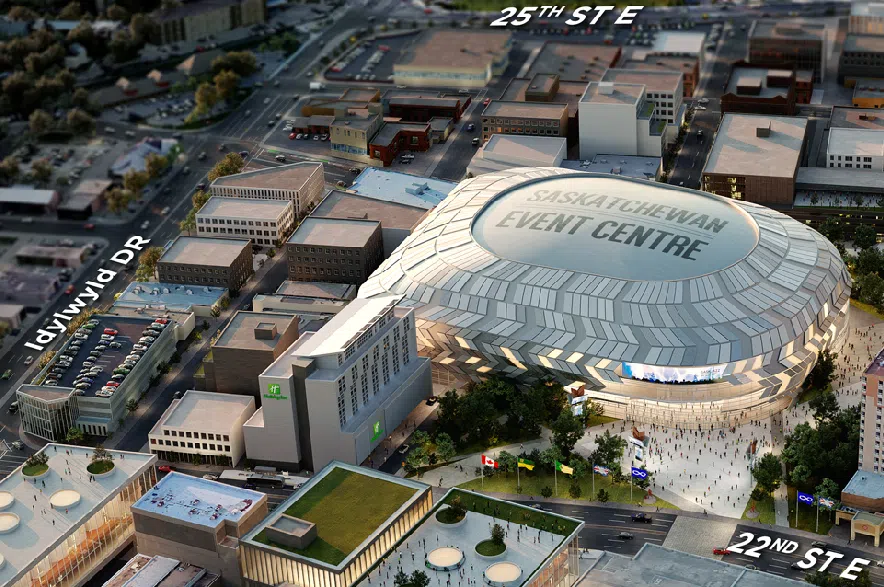The City of Saskatoon appears to be taking a time-out when it comes to moving forward with its proposed $1.2 billion Downtown Event and Entertainment District (DEED) project.
That’s because the uncertain economic climate and federal election results could impact some of its major revenue sources, including the one from Denver-based company Oakview Group 360 (OVG360), which operates various arenas and event centres across North America.
Read more:
- ‘Near-record demand’: Sask. housing market surges, defying tariffs concerns
- Sask. to end Grade 12 provincial exams as new assessment program developed
- Scott Moe shares thoughts on federal election, tariffs on Evan Bray Show
In August 2024, the city proposed a partnership with OVG360 which could bring in $170 million over 25 years for the project, including $20 million in an up-front capital contribution.
The project for the new downtown arena and entertainment district is expected to cost $1.22 billion without raising property taxes.
Instead, the money would come from an accommodation tax, amusement tax, parkade revenues, possible funding from provincial and federal levels, and OVG360.
At the city’s next governance and priorities committee meeting on Wednesday, administration will ask committee members to explore a six-month pause on its agreement framework for the arena project with OVG360 as it deals with all the uncertainty.
“We know assembling of the full funding plan isn’t going to happen overnight,” said Saskatoon’s director of technical services Dan Willems.
“That intervening period gives us some time to hopefully let things stabilize and see where we’re at before bringing forward this agreement for city council’s consideration.”
Willems said the city and OVG360 have been in contact with each other about the possible pause.
Jason Aebig, CEO of the Greater Saskatoon Chamber of Commerce, said he’s more than OK with pausing things until there’s some clarity for the project.
“The project has reached the stage now where we have a funding plan for this development and a big part of it turns on private investment and federal and provincial government participation,” Aebig said.
“In both realms, there’s a lot of uncertainty at the moment. In the case of the federal government, there isn’t actually anybody in their seats because we’re in the midst of an election campaign. You’d have to press pause, because most of the major streams that have been identified to make this happen are sort of dammed up at the moment.”
He said he doesn’t think the pause will hurt the project.
“The fundamentals of the project are still sound. I think the investment opportunity for both private sector and government participation is still sound,” Aebig said.
“We just have to make sure that we’re pitching it at the best time and that is contingent on politicians being in their seats and the investment community not feeling like the world’s coming down around them.
“It’s wise to probably press pause at this point to make sure that the very first conversations that we’re having with any of those funders is at a time where they they see the opportunity and they feel like they can act on it,” he said.
Willems admitted taking a pause on any project is pretty rare.
“It is definitely warranted. Things are changing day by day with the political situation with the United States and Canada,” he said.
“I can’t think of any other time when this much upheaval was affecting things. The closest that I can think of would be the impacts of Hurricane Katrina on some of the construction industry across North America.”
‘Significant concerns’ from downtown businesses
Shawna Nelson, executive director of the Downtown Saskatoon Business Improvement District (BID), said she’s concerned about the city’s plan to pause progression of the project.
“While we understand the need to assess risks in a shifting landscape, a delay of this nature at such a pivotal stage raises significant concerns for the downtown Saskatoon business community,” Nelson said in a statement.
“This project and its impact represents a transformational opportunity for downtown Saskatoon. The DEED is expected to drive foot traffic, business growth, investment and civic and provincial pride,” Nelson said.
“A pause of an uncertain length creates a potential loss of momentum that could affect investor interest and economic recovery in our downtown core. Delays without clear communication risk undermining that support and confidence.”
Nelson added the Saskatoon BID remains supportive of the project, but to move forward successfully there must continue to be a collaborative process with open communication and commitment.
Read more:











